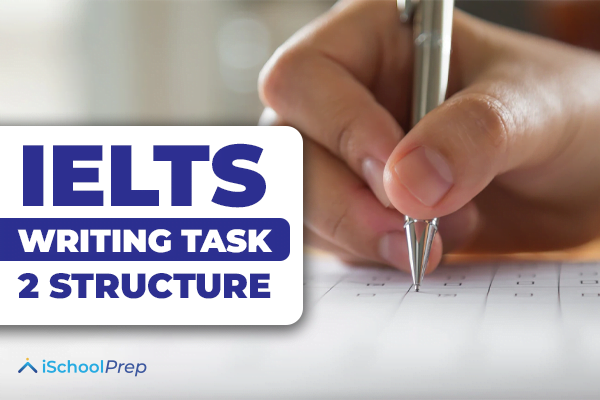Table of Contents
In the IELTS writing task 2, you will be asked to respond to a specific issue, argument, or point of view. Test your ability to respond in writing by giving and defending an opinion, addressing the topic, summarizing details, defining issues or problems, and coming up with possible solutions, all while backing up your points with specific examples from your own life.
IELTS writing task 2 | An overview
For IELTS writing task 2, you must write at least 250 words. The score for task 2 is more critical than for task 1. The scripts are graded by IELTS examiners who have had a lot of training and all have the credentials they need to teach.
You must address both sides of an issue. A lot of the time, you’ll be asked for your thoughts and opinions too. Choosing a side to agree with and a side to disagree with in an IELTS task 2 question is the most straightforward strategy. No matter how fluent your English may be, you must study IELTS writing abilities before taking the writing task 2 exam. IELTS writing task 2 questions often require you to express your opinion, and if you don’t, you won’t be able to answer the question correctly.
Exam structure

IELTS writing task 2 essay structure is a critical ability that might mean the difference between earning a good band score or not. What you add in each of the areas will depend on the type of question you’re answering.
In most task 2 essays, there is a standard structure-
- Introduction
- Main paragraph 1
- Main paragraph 2
- Conclusion.
Introduction
The introduction is the primary part of most IELTS writing task 2 types that the examiner will read, giving the examiner a good idea of the rest of the essay. If you don’t include a sentence that explains what the rest of your essay will be about, the examiner won’t know what you will talk about. This will also cause you to lose points.
A bad example of an introduction talks about the topic in a very general way, uses words and phrases from the question and doesn’t have a thesis statement or an outline statement. Your essay’s thesis is the most important sentence. This is your main point, and it says how you feel about the whole thing in one sentence.
It shows that you understand the question and will help you learn how to write IELTS writing task 2 that is clear and makes sense. It is always just one sentence, so you must practice putting your opinion into one sentence. It should also talk about the small keywords, not just the topic as a whole.
Main paragraph 1

When writing an IELTS essay, the primary goal is to provide the examiner with what they’re looking for. When an examiner is having a good time, it usually translates into good grades. When writing an essay, you must first respond to the question and then structure it such that the ideas flow naturally from one to the next.
For task achievement and cohesiveness, achieving this will earn you excellent marks. The importance of the topic sentence cannot be overstated. It serves as a guidepost for the rest of the paragraph, indicating the subject matter.
Before you begin writing, it’s important to remember these IELTS writing task 2 tips-
- Make a detailed outline of the essay.
- Plan your essay on the question paper during the test.
- Make a list of your main points and the justifications for each one. The primary end of each paragraph should be tied to the position you stated in the introduction.
Main paragraph 2
The paragraph’s theme is indicated by this statement, which is known as a “topic sentence.” You’ll need to support your claims with specific examples after stating your thesis. There are several ways to find models, including personal experience, news stories, and articles or academic studies you’ve read.
A well-structured paragraph may be achieved by ensuring that each sentence in an IELTS Writing paragraph flows from the preceding one and then linking the sentences together at the end. “Skillfully controls paragraphing” is the rubric’s description of a high-scoring essay. It is imperative to follow this IELTS writing task 2 format.
Remember that the body paragraphs make up more than half of the essay’s word count; this is a good rule of thumb to keep in mind. The structure of those paragraphs will significantly impact your grade if you can get it right.
Conclusion paragraph

In many respects, writing the conclusion is the most straightforward part of the paper since you’re just restating what you’ve already said in the introduction and the major body of the essay. However, since this is the last piece of writing the examiner will read, you must wrap it up with a bang.
Since you won’t have much time left to write your conclusion, you must practice and master this skill as soon as possible. The conclusion should always restate the essay’s main points rather than a new argument. The body, not the conclusion, is where new ideas belong.
To paraphrase is not to rewrite the entire text word for word. Feel free to repeat words if you can’t think of a way to alter them. However, changing every word in your IELTS writing task 2 vocabulary is impossible. Thus it is best to strive to use various words in your writing. It’s better to repeat a word correctly than to make a mistake. If you haven’t written a conclusion to your essay, it will be tough to achieve a high mark on task 2. All your IELTS writing task 2 questions should be answered by this point.
Key takeaways
- Your score is based on how well you answer the question and use language and vocabulary.
- Being familiar with your subjects is the best preparation for writing about them it’s essential for knowing how to do IELTS writing task 2. During the examination, you will be required to formulate ideas and provide examples based on your knowledge and experience.
- It is inconsistent with altering your opinion mid-essay or providing reasoning supporting your disagreeing viewpoint.
- Keep new ideas out of your conclusion. If you found more info on the subject, add it to your main paragraphs.
We hope you enjoyed reading this blog. In case of any queries, reach out to us or drop a comment below!
Liked this blog? Read next: Top universities without IELTS | Canada, UK, US, and more!
FAQ
Q1. Is this type of structure necessary for a good score?
Answer- While it’s not a law to follow this IELTS writing task 2 template, it’s easy to follow and will prove useful for your essay.
Q2. Should I use a lot of complex words?
Answer- Expanding your vocabulary is always good, but don’t get carried away. Using many difficult words can make your writing harder to understand and make you more likely to make mistakes.
Q3. How important are examples of my subject?
Answer- Don’t forget that the examiner is looking for proof of your claims, not just ideas.







